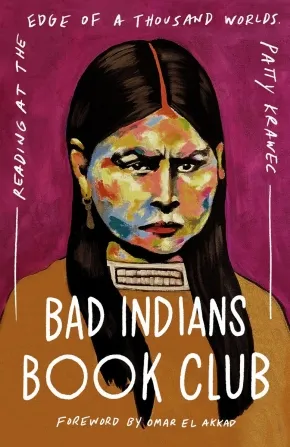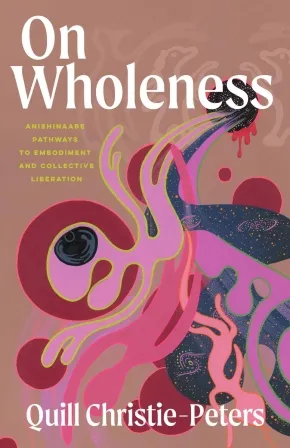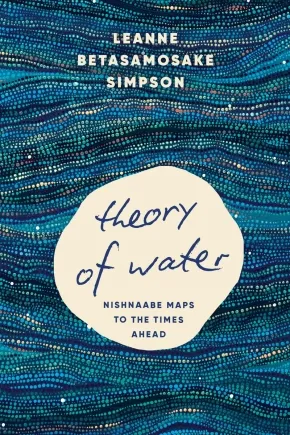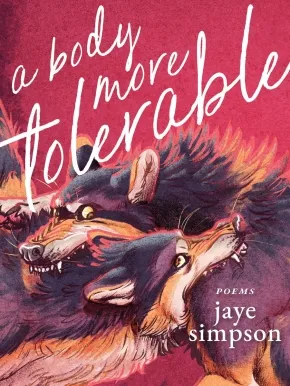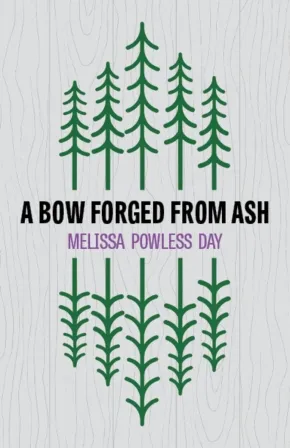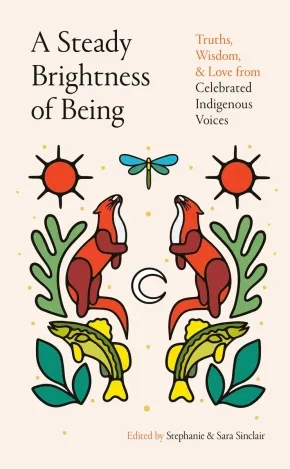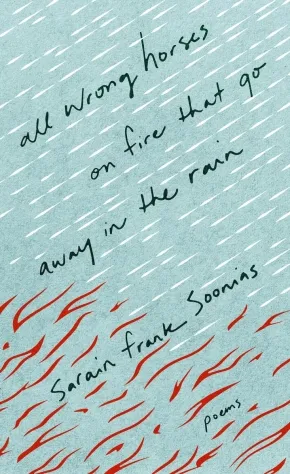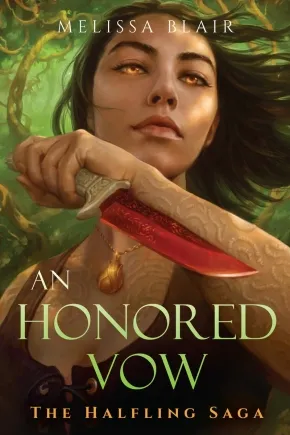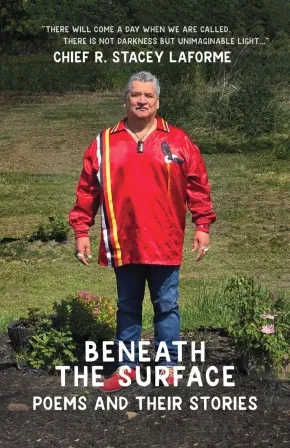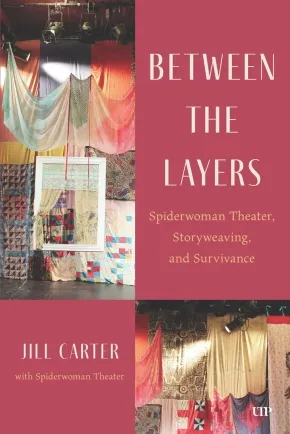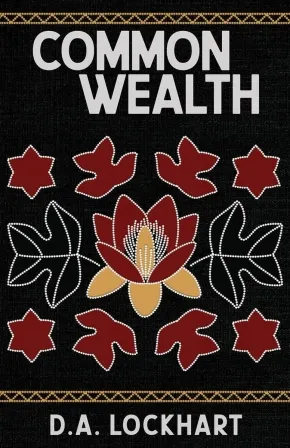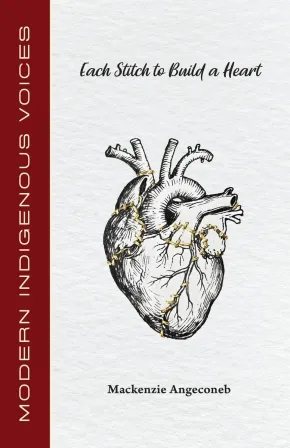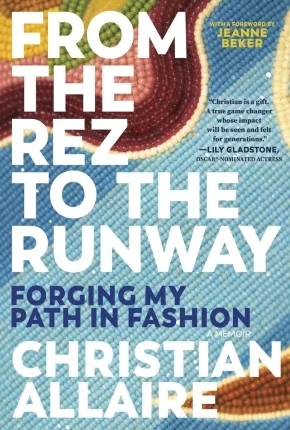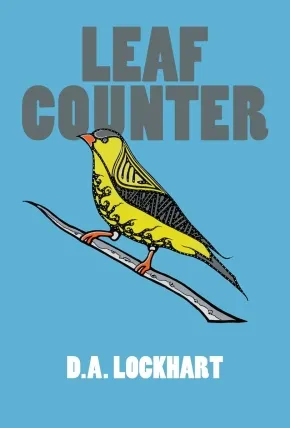Anishinaabeg
Synopsis:
In this powerful reframing of the stories that make us, Anishinaabe writer Patty Krawec leads us into the borderlands to ask: What worlds do books written by marginalized people describe and invite us to inhabit?
Patty Krawec doesn’t want to be a “Good Indian.” When a friend asked what books could help them understand Indigenous lives, Patty Krawec gave them a list. This list then exploded into a book club, then into a podcast about a year of Indigenous reading, and then, ultimately, into this book.
Drawing on conversations with readers and authors, Bad Indians Book Club delves into writing about history, science, and gender, and into memoirs and fiction, all by “Bad Indians” and those like them, whose refusal of the dominant narrative of the wemitigoozhiwag (European settlers) opens up new possibilities for identity and existence.
Introducing each chapter with flash fiction about a shapeshifting Deer Woman, who is on her own journey to decide who she is, Krawec leads us into a place of wisdom and medicine where stories of and by marginalized writers help us imagine a thousand worlds waiting to be born.
Reviews
“Bad Indians Book Club is a compendium of worlds. From a lifetime of reading, there emerges a marriage of tapestry and map, a vision of the literary canon not as some secret handshake of the correctly educated but as a living, growing organism. . . There’s a dangerousness to a book like this. It’s not enough to define the Good Indian, the Grateful Immigrant, the Untroublesome Minority. Nor is it enough to simply reject these designations. One must interrogate how they came to hold so much power, how they offer the willing participant so many crumbs of reward from colonialism’s table.”— Omar El Akkad, author of One Day, Everyone Will Have Always Been Against This, September 2025
“Bad Indians Book Club is like a kind and protective auntie guiding you through a sometimes hostile world with sheer wisdom and wit. It’s a resounding rallying cry for our stories and our peoples. There’s no other book club I’d want to be in!”— Waubgeshig Rice, author of Moon of the Turning Leaves, September 2025
“This genre-crossing, shape-shifting, imagination-expanding book is for all who love to, and also need to, read. We tell stories to live, and this enlivening book reflects on all kinds of stories, each page suffused with Patty Krawec’s unmistakable voice and generous, timeless wisdom.”— Astra Taylor, author of The Age of Insecurity: Coming Together as Things Fall Apart, September 2025
“I didn’t want the Bad Indians Book Club to end. I read it at the perfect time, when snow was on the ground, in a period of rest and renewal. Patty Krawec made me wonder and made me ponder. Her book is a call to action to be curious, vigilant, to listen to and receive the inner strength of the land, to create and recreate community, to agitate, to investigate, to take story into ourselves and to hold the teachings sacred. As she guides us, throughout the book she tells us a new, sustaining, serial story about Kwe, Deer Woman. Such a gift. There is so much goodness in The Bad Indians Book Club!”— Shelagh Rogers, Shelagh Rogers, Truth and Reconciliaton Commission Honorary Witness, recovering broadcast journalist, September 2025
“Bad Indians Book Club is full of good medicine — challenging us to ask questions and bringing us home to ourselves. As Patty Krawec guides us into the deep wisdom wells of many people who journey in kinship, we consider how to hold the curiosity of care and stories, and what it means to imagine and create a future that integrates all our stories into a web of healing. Please buy this book, and celebrate the power of story in a weary yet flourishing world.”— Kaitlin B. Curtice, author of Living Resistance, September 2025
“In Bad Indians Book Club, Patty Krawec provides critical space for the ne'er-do-wells, disrupters, red sheep, box-busters, tricksters, and all us rowdy relatives defying expectations. Indigenous people have always been proverbial thorns in the sides of colonizers, and this piercing book does an incredible job of letting the air out of today’s imperialist narratives.”— Taté Walker, Two Spirit Lakota storyteller and community-builder, September 2025
“With Bad Indians Book Club, Patty Krawec gifts us a compelling investigation into the power of not just reading books but also doing so in community. Krawec makes the case for building your circle through reading, as a way of being in better relations with all our kin, including the land. Thinking deeply alongside other books, Bad Indians Book Club is a needed guide at a moment when books are under attack. Books are not just written culture, they are also oral culture, and Krawec illuminates this beautifully.”— Chanda Prescod-Weinstein, author of The Disordered Cosmo, September 2025
Additional Information
232 pages | 6.00" x 9.00" | Paperback
Synopsis:
A brilliant exploration of the body as a site of settler colonial impact, centring embodied wholeness as a pathway to our collective liberation.
This fierce and enlightening book reimagines the way we understand settler colonialism-through the body itself. Anishinaabeg visual artist Quill Christie-Peters takes us on a journey that begins before birth, in a realm where ancestors and spirits swirl like smoke in the great beyond. But once we enter the world, our bodies are shaped and scarred by colonial forces.
In poetic and raw storytelling, Quill shares her own experiences of gendered violence and her father's survival of residential school, revealing how colonialism disconnects us from ourselves. Yet, through an Anishinaabeg lens, the body is more than just flesh-it extends to ancestors, homelands, spirit relations, and animal kin.
Through reflections on childbirth, parenting, creative practice, and expansive responsibility as pathways to wholeness, Quill explores how reconnecting with the body can be an act of resistance and healing. She shows that wholeness-despite pain and displacement-is not just possible but essential for liberation, not only for Indigenous people but for all of us.
Additional Information
288 pages | 5.50" x 8.50" | Paperback
Synopsis:
Acclaimed Nishnaabeg writer Leanne Betasamosake Simpson takes a revolutionary look at that most elemental force, water, and suggests a powerful path for the future.
A genre-bending exploration of that most elemental force-water-through Indigenous storytelling, personal memory, and the work of influential artists and writers.
For many years, Leanne Betasamosake Simpson took solace in skiing--in all kinds of weather, on all kinds of snow across all kinds of terrain, often following the trail beside a beloved creek near her home. Recently, as she skied on this path against the backdrop of uncertainty, environmental devastation, rising authoritarianism and ongoing social injustice, her mind turned to the water in the creek and an elemental question: What might it mean to truly listen to water? To know water? To exist with and alongside water?
So began a quest to understand her people's historical, cultural, and ongoing interactions with water in all its forms (ice, snow, rain, perspiration, breath). Pulling together these threads, Leanne began to see how a "Theory of Water" might suggest a radical rethinking of relationships between beings and forces in the world today. In this inventive work, Simpson draws on Nishnaabeg origin stories while artfully weaving the work of influential writers and artists alongside her personal memories and experience--and in doing so, reimagines water as a catalyst for radical transformation, capable of birthing a new world.
Theory of Water is a resonant exploration of an intricate, multi-layered relationship with the most abundant element on our planet--one that, as Simpson eloquently shows, is shaping our present even as it demands a radical rethinking of how we might achieve a just future.
Additional Information
224 pages | 5.50" x 8.25" | Hardcover
Synopsis:
Ferocious and vulnerable poems about redefining acts of creation, destruction, deconstruction, and recreation, from a singular Indigiqueer point of view
a body more tolerable is a collection of powerful and haunting poems combining faerie tales, mythology, and a self-divinized female rage. Divided into three parts, the book examines Indigenous grief, trans identity, and frustrated desires in ways that reject perception. Gone is the soft, kind, gentle girl that author jaye simpson once thought she would become. Instead, she unravels the sticky threads of colonialism with poems that exact lyrical acts of self-surgery.
In these visceral poems, teeth gleam, graze skin, and sink into flesh, becoming bloodied and exposing the animalistic hunger that lies within. Pulsating with yearning and possibility, a body more tolerable is a book that resists typical notions of physicality and sex to dream of a world more divine. It is a call-out into the canon for a new age, one filled with retribution and recompense.
Reviews
"jaye simpson's a body more tolerable is a singular achievement. Her poetic project, at once forward-dawning and ancestral, both revolutionary and decolonizing, is given total expression in this book. These poems moved me immensely; there is so much beauty and feeling power in all of them. No one is writing like jaye simpson." -Billy-Ray Belcourt, author of A Minor Chorus and Coexistenc
"a body more tolerable is a work at once open and lyric, fearless and tender. Expanding grief's territory into moments of relation and desire, simpson also challenges "home, as a wayward theory" into a poetics of self-mothering, of being beyond becoming. This collection is a fierce and resistant nurturing." -Liz Howard, author of Infinite Citizen of the Shaking Tent and Letters in a Bruised Cosmo
"jaye simpson is one of the most compelling and incisive voices of their generation. In a body more tolerable, they seize the English language and command it into an instrument that meticulously sings the realities of their present moment. I found solace, fire, and a relentless love for living and loving in these poetic offerings. a body more tolerable is a wayward map, and it is gorgeous. I'll carry it close to my heart." -Leanne Betasamosake Simpson, author of Noopiming: The Cure for White Ladies
"i can't retire this tongue," jaye simpson writes in a sophomore collection that creeps, howls, floats, shatters. an Indigenous speaker grapples with survival, the foster care system, the body, conceptions of motherhood, and trans girlhood in this heart-wrenching leap that returns what is most precious to us through lush language and keen lyricism. each poem is a portal of longing, ferocity, softness. i can't recommend it enough." -Kinsale Drake, National Poetry Series-winning author of The Sky Was Once a Dark Blanket
Additional Information
88 pages | 6.00" x 8.00" | Paperback
Synopsis:
A Bow Forged from Ash is a journey of Indigenous reclamation. In poems that explore identity, belonging, responsibility and wholeness, Melissa Powless Day navigates her ties to the landscapes of Southwestern Ontario and the nations to which she belongs. Traversing lived experience, ancestral memory, family stories, and critical engagements with the Land, Powless Day pulls back the bow of language: her poems are poised, unyielding in their nanda-gikendang, their seeking, to voice complex stories about the messiness of returning home, a restoration of familial and community bonds generations in the making. Ultimately, A Bow Forged from Ash is a book that proves reclamation and resistance are inseparable: one cannot walk with pride in their Indigeneity without choosing to resist the colonial status quo.
Additional Information
112 pages | 5.50" x 8.50" | Paperback
Synopsis:
Bringing together voices from across Turtle Island, a groundbreaking collection of letters from Indigenous writers, activists, and thinkers—to their ancestors, to future generations, and to themselves.
Drawing on the wisdom and personal experience of its esteemed contributors, this first-of-its-kind anthology tackles complex questions of our times to provide a rich tapestry of Indigenous life, past, present, and future. The letters explore the histories that have brought us to this moment, the challenges and crises faced by present-day communities, and the visions that will lead us to a new architecture for thinking about Indigeneity. Taking its structure from the medicine bundle—tobacco, sage, cedar, and sweetgrass—it will stir and empower readers, as well as enrich an essential and ongoing conversation about what reconciliation looks like and what it means to be Indigenous today.
Contributors: Billy-Ray Belcourt, Cindy Blackstock, Cody Caetano, Warren Cariou, Norma Dunning, Kyle Edwards, Jennifer Grenz, Jon Hickey, Jessica Johns, Wab Kinew, Terese Marie Mailhot, Kent Monkman, Simon Moya-Smith, Pamela Palmater, Tamara Podemski, Waubgeshig Rice, David A. Robertson, Niigaan Sinclair, Miss Chief Eagle Testickle, Zoe Todd, David Treuer, Richard Van Camp, katherena vermette, Jesse Wente, Joshua Whitehead.
Additional Information
192 pages | 5.50" x 8.25" | Hardcover
Synopsis:
A captivating search through one family’s history, All Wrong Horses on Fire that Go Away in the Rain is a stunning examination of intergenerational trauma and its effect on Indigenous voices. Aftershocks and fragmented memories ricochet through this collection, bringing with them strength, intensity and uninhibited beauty. Recalling pivotal work by Billy-Ray Belcourt, jaye simpson, Joshua Whitehead and Emily Riddle, Sarain Frank Soonias makes his poetic debut with a splash that ripples far outside his own work, and marks the entrance of a new, important voice in contemporary poetry.
Reviews
“Sarain Frank Soonias introduces us to himself and his craft with this strong, stunning debut. Language woven together with skillful storytelling and metaphor reminds us that our people will always create beautiful art, even in what feels like an abyss. This book is about the responsibility we have to heal ourselves while collectively working for a better world for future generations.” — Emily Riddle, award-winning author of The Big Melt
Additional Information
132 pages | 9.00" x 5.50" | Paperback
Synopsis:
This thrilling romantasy about king’s Blade, Keera, and her epic quest to avenge her lover, save her people, and bring down a tyrant king is the final installment of Melissa Blair’s highly acclaimed series. The Halfling Saga showcases BIPOC and queer representation, love, passion, betrayal, magic, and great battles of the sword and the soul.
“Your land is not the one you take; it is the one you die for.”
Keera has tried to keep her final promise to Brenna, the partner she was forced to kill to save a kingdom—but that promise has led to the most difficult struggles of her life. She’s been at war with her worst self while battling King Damien for the freedom of the Halflings, and she’s lost too many along the way. But when she finally breaks the last seal, unleashing the Fae magic that’s been hidden away for hundreds of years, the conflict seems to be turning in the Halflings’ favor.
Meanwhile, Keera’s discovery of a staggering secret about her lover and the kidnapping of one of her closest allies threatens to tip her back into darkness, but she has no time to rest. Opening the kingdom’s magical seals has transformed Keera in ways even the wisest Fae elders could not have anticipated, and the return of an evil thought long vanquished throws their rescue plans into chaos. And with the kingdom’s Halfling population suddenly posing a risk to the crown, the land is plunged into violence as the king begins a new blood purge. Keera and her allies must gather an army to meet Damien’s forces in a final confrontation of epic—and tragic—proportions.
The stunning conclusion of BookTok sensation Melissa Blair’s epically romantic series will leave readers breathless as Keera fights for her land, her people, and the promise of a better world.
Reviews
"[F]illed with high-stakes action, choices, and consequences... Romantasy fans should add this series to their reading list." —Library Journal
Educator & Series Information
Young adult/new adult fantasy series recommended for ages 18+.
This is the final book in The Halfing Saga.
Additional Information
432 pages | 6.00" x 9.00" | Paperback
Synopsis:
Chief Stacey Laforme, an esteemed Indigenous leader and storyteller, breathes life into every poem and story, drawing upon his deep cultural roots. Rich with the essence of his soul, the poems in Beneath the Surface capture the moments and emotions that have shaped him, offering a poignant exploration of identity, resilience, and hope. Through humour and pain, Laforme invites readers to not just read, but to truly feel the weight and wisdom carried within each verse.
This collection goes beyond poetry, providing rich backstories and leadership insights that contextualize the verses. As in his earlier collections, Living in the Tall Grass and Love, Life, Loss and a little bit of hope, Laforme once again extends an invitation to readers, encouraging them to see the world through Indigenous eyes. Themes of peace, humanity, grief, and trauma are woven throughout the book, creating a tapestry of reflection, healing, and ultimately, hope.
Beneath the Surface serves as both a deeply personal reflection and a call for greater understanding and connection, illuminating the complexities of life through the lens of Indigenous wisdom and storytelling.
At the end of this book, this journey, Laforme seeks to help you better answer the following questions. Who was I, Who am I, and Who do I want to be? As a person, a people, a country, a world, who do we want to be?
Additional Information
192 pages | 8.50" x 5.50" | Paperback
Synopsis:
This meditation on the poetics of re-worlding follows the threads of Spiderwoman Theater’s Storyweaving practice back to its Guna and Rappahannock sources to illuminate its history, mechanics, and development for coming generations.
The Spiderwoman Theatre, the longest-running Indigenous theatre company in North America has heralded the revolutionary methodology of Storyweaving for generations of Indigenous artists. Storyweaving is a distinct methodology that governs the dramaturgical structure and performed transmission of the company’s plays on the contemporary stage. The practice of Storyweaving predates written history. It has been (and remains) specific to tribal storytellers across the continent.
The reclamation, then, of this aesthetic legacy by contemporary Indigenous storytellers is a crucial act of recovery. Jill Carter, an Anishinaabe-Ashkenazi theatre-worker and scholar, examines the process and development of Storyweaving. She studies how Storyweaving imagines and architects a functional framework that is being adopted and adapted by artists from myriad nations to create works (on the page and stage) that facilitate the healing, transformation, and survivance of their communities. Between the Layers pays respects to the teachers and visionaries that moulded this practice and encourages future generations to continue its legacy, while making a much-needed contribution to the study of Indigenous theatre and performance.
In its painstaking documentation of the Storyweaving artform, Between the Layers refuses the devaluation, erasure, and suppression of Indigenous culture, while contributing to the dissemination and celebration of Indigenous Knowledge Systems.
Educator Information
Table of Contents
List of Illustrations
Acknowledgements
Spiderwoman Theater: A Performance History
Introduction: Between the Layers
Chapter One:
Persistence of Violent Delights:
“It’s All the Same Bullshit Again”
Chapter Two:
“An Indian is an Idea a Man Has of Himself”
Chapter Three:
An Indian is More than Just an “Idea”:
By Their Acts Ye Shall Know Them
Chapter Four:
Towards a Poetics of Re-Worlding:
Becoming (and then Staging) the New Human Being
Chapter Five:
The Published Texts
Chapter Six:
The Three Sisters from There to Here:
Spiderwoman’s Issue and the Project of Re-worlding
Appendices
Works Cited
Additional Information
376 pages | 6.00" x 9.00" | 8 illustrations | Hardcover
Synopsis:
Commonwealth is a profound lyrical meditation on the pre- and post-colonial migrations of the Lenape population throughout the American Midwest, from the watershed of Weli Sipu (the Ohio River) in the Commonwealth of Kentucky to Indiana and beyond. This is a book that transcribes the languages of rivers, highways, rail lines, and buffalo traces. It seeks—or is pushed toward—destinations that are always over the horizon. It is about the fluidity of space and time, and the tangibility of history. As the Lenape journey ever northward and westward, they both create and are created by a collective body of stories: stories of belonging and exclusion, of freedom and confinement, of aspirations and hard truths. Commonwealth explores the ways landscape and people inform one another, and does so in a way that is as clear as a broad Ohio sky.
Additional Information
116 pages | 5.50" x 8.50" | Paperback
Synopsis:
The central theme of this poetry collection revolves around the idea that each individual is shaped by the connections they forge with others throughout their lives. Each poem serves as a tribute to the relationships that influence us, weaving a rich tapestry of shared experiences and emotions. The collection is guiding readers through a journey of reflection and introspection. Each poem follows a distinct outline: it begins with a cherished memory that encapsulates the essence of the relationship, then delves into the significance of that bond and what it has taught us. Next, the poems explore the evolution of these connections—whether they have transformed, faded away, or remain vibrant in our lives. As the verses unfold, they evoke sensory reminders of these individuals—objects, places, or moments that bring them to mind—while also celebrating the qualities we admire in them. The poems culminate in a heartfelt exploration of their lasting impact on our identities and the permanent marks they leave behind. Each poem becomes a mirror, inviting readers to consider their own relationships and the intricate ways in which these connections shape who they are. Through this collection, we are reminded that we are, in many ways, a mosaic of everyone we have loved, learned from, and lost along the way.
Educator & Series Information
This book is part of the Modern Indigenous Voices series.
Additional Information
96 pages | 5.50" x 8.50" | Paperback
Synopsis:
Growing up on the Nipissing First Nation reserve in Northern Ontario, Christian Allaire wanted to work in the fashion industry, a future that seemed like a remote, and unlikely, dream
He was first introduced to style and design through his culture’s traditional Ojibwe powwow regalia—ribbon skirts, beaded belts, elaborate headdresses. But as a teenager, he became transfixed by the high-fashion designs and runway shows that he saw on Fashion Television and in the pages of Vogue.
His unwavering interest in fashion led him to complete a journalism degree so he could pursue his goal of becoming a full-time fashion writer. After landing his first big magazine job in New York City, Allaire found himself working at the epicentre of the international fashion industry. His dream had come true. Yet he soon realized the fashion world—and his place in it—wasn’t always quite as glamorous as he imagined it would be.
From grinding as an unpaid intern, to becoming a glitzy (but overworked) fashion editor, Allaire writes with feeling about the struggle to find his place—and community—in the highly exclusive world of fashion. And he recounts, with great candour, the difficulty of balancing his ambitions with the often-inaccurate perceptions—including his own—of his culture’s place in the realm of fashion.
Full of joy, honesty, adversity, and great clothes, From the Rez to the Runway is a gripping memoir about how to achieve your dreams—and elevate others—while always remaining true to yourself.
Reviews
“Christian is a gift. He embodies the precious intersection between arts and advocacy, and is a truly grounded and inspired human being. In having such a curated, unique and sharp eye for both classic and cutting edge design, coupled with an unshakable commitment to elevating Indigenous designers, he has carved a necessary space which elevates Indian Country and the world of fashion as a whole. A true game changer whose impact will be seen and felt for generations.” — Lily Gladstone, Oscar-nominated actor
Funny, honest and utterly charming, From the Rez to the Runway lends the cliche fashion editor origin story a refreshing new perspective. With a true sense of passion and wide-eyed wonder, Christian Allaire pursues his personal quest for creativity, purpose and self-discovery and finds that staying true to one’s self brings the greatest rewards. Brimming with moving family memories from the reservation and hilarious fashion misadventures alike, the book is a must-read for all the so-called outsiders and misfits who’ve ever dared to follow their dreams. — Chioma Nnadi, Head of Editorial Content, British Vogue
From beadwork to Burberry, Christian Allaire is a force in fashion. He paints a portrait of a complicated industry rarely seen behind the scenes — let alone traversed by Indigenous writers. In this compelling and inspiring memoir, Allaire details how he carries community with him through every glass ceiling he shatters. His work, and this memoir, are a triumph. After all, ‘Don’t mess with a rez kid.’ — Devery Jacobs, Filmmaker and Actor, Reservation Dogs
There is a new generation of Fashion Transformers and Christian Allaire is leading the movement. Allaire has been chosen by spirit to shine a light on Indigenous Fashion and Art, and he has done so at the highest levels, from New York to Paris, and all around the world. He is a door opener for the truth, power, and beauty of true fashion and its creators. — Kelly Cutrone, founder of People’s Revolution and New York Times bestselling author
Additional Information
272 pages | 6.00" x 9.00" | Paperback
Synopsis:
From veteran hockey reporter Patrick Johnston and Gino’s longtime friend Peter Leech comes the authorized biography of Gino Odjick.
In the 1980s and ’90s, National Hockey League games were very different from the nimble, skill-focused displays we see today. One of the greatest differences—and one of the sport’s more popular facets at the time—was the widespread presence of “enforcers”: hulking, battle-scarred players whose main task was to police the sport by chasing down and brawling with opponents who had broken unwritten codes determining which aspects of violence counted as dishonorable or unjustified.
When hard-hitting Vancouver Canucks player Gino Odjick emerged in the early 1990s, he quickly became one of the game’s most feared enforcers and revered teammates, a sign of a new era for the team, racking up 296 penalty minutes in the 45 games he played in his rookie season. Hailing from Kitigan Zibi, an Algonquin community near Maniwaki, Quebec, Gino was one of the few Indigenous players in the NHL at the time. But it was Gino’s ferocious play contrasted by his genuinely affable and openhearted personality off the ice that won him a special place in the hearts of Canucks supporters.
Yet legends often obscure the human stories behind them. Patrick Johnston and Peter Leech look beyond Gino’s legendary persona, drawing on insights from family members, friends, and teammates to recount Gino’s early years in a loving household that was always ready to welcome foster children. Gino’s father, Joe, had suffered the lonely traumas of the residential school system, and the experience had instilled a commitment in the family to those who were less fortunate.
The book also details Gino’s eventual struggles with alcohol abuse, and how he responded by taking on the role of empathetic mentor to young Indigenous people, travelling from community to community to hear their stories and offer hope. He never wavered in this role, even as he confronted serious illnesses, including chronic traumatic encephalopathy (CTE) and the rare blood disorder that he survived for years longer than expected, but that eventually led to his death at age fifty-two.
Gino is a moving tribute to a beloved hockey legend.
Reviews
"Gino was the greatest teammate; he had such a huge heart and knew his role better than anyone in the league. Gino loved being a Vancouver Canuck and gave back to the community in so many ways. He will be greatly missed by his family, friends, and fans. This book will give people insight into his remarkable life."—Geoff Courtnall
“Gino provides a compelling account of the life of a beloved Vancouver Canuck. From his humble beginnings in Quebec to NHL stardom and beyond, Odjick was dedicated to the well-being of teammates and the Indigenous community. This is an excellent tribute to an exceptional man.”—Randi Druzin, author of Between the Pipes and Behind the Mask
Additional Information
288 pages | 6.00" x 9.00" | b&w insert | Hardcover
Synopsis:
Flow into a new season in one of Canada’s most celebrated literary landscapes, with Leaf Counter. A lyric decolonial romp through the Ontario’s famed Prince Edward County, Aginjibagwesi (Spinus tristis) draws us through the poetics of the land and the struggles of the poet as decolonizer in this new epic border-crossing collection. Golden witness to the timelessness of land and spirits, Leaf Counter criss-crossed the lands around Ameliasburgh, its ghosts, heroes, and even the poets of Purdy’s A-Frame. Leaf Counter knows of sorrow, struggle, and wends a tale in a braided narrative as he scans "light and steeple” and sees timeless men at the centre and edges of the order of things, Simon Girty, Al Purdy, Charles Bukowski, and even Bret Hart, move and shift in time and place. Leaf Counter is our celestial, Lenape, winged guide of legend and myth. And through his spring enumeration of all things, we garner an understanding of the famed Canadian poet Al Purdy and the lands that he grew from. Witness the collapse of the old repressive order through the eyes of the poet and movements of the mighty little bird.
Additional Information
148 pages | 6.00" x 9.00" | Paperback

